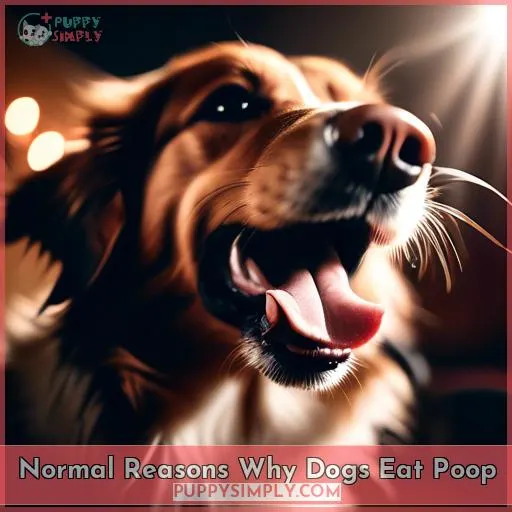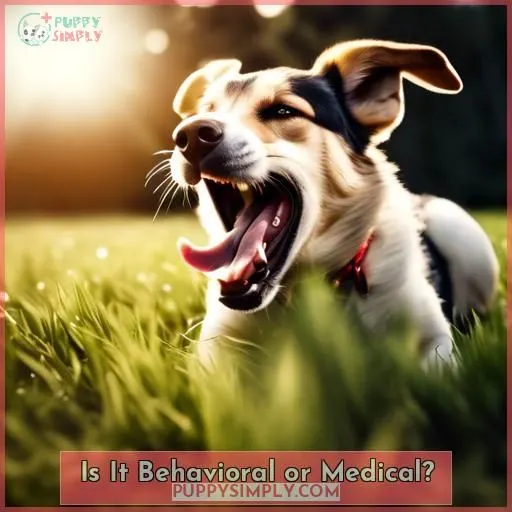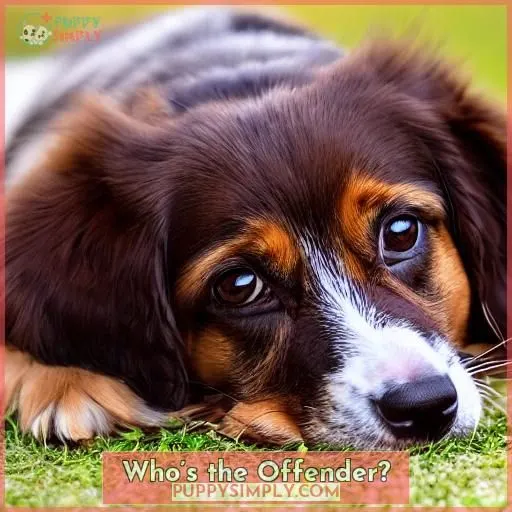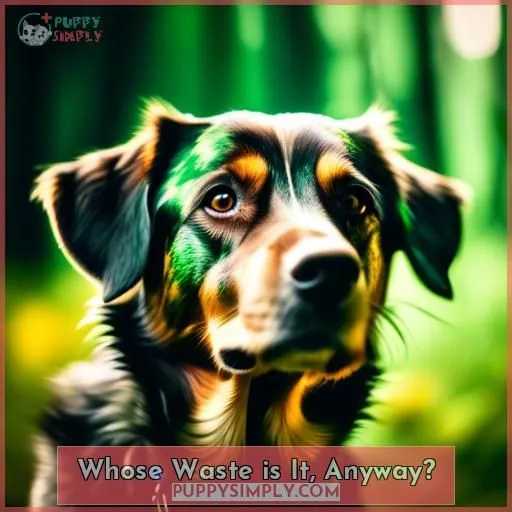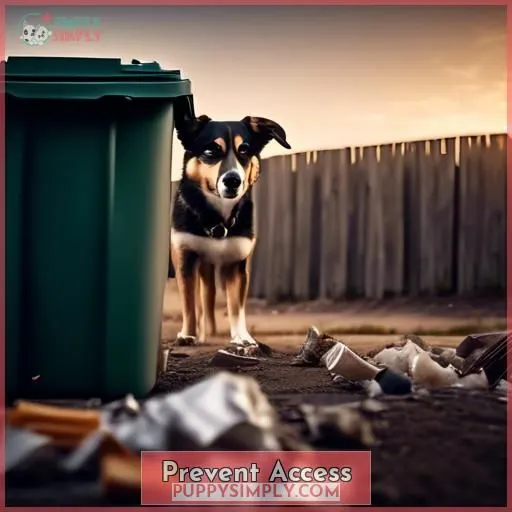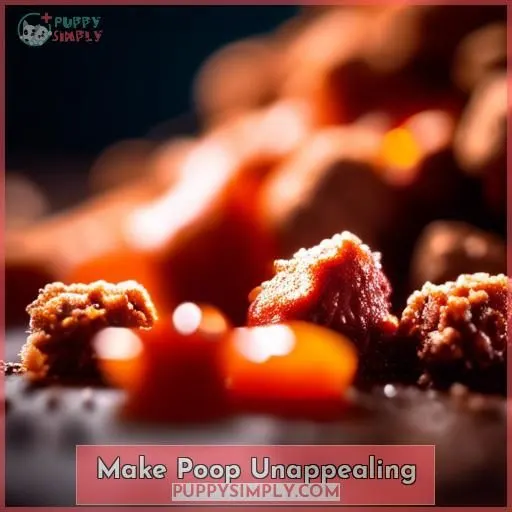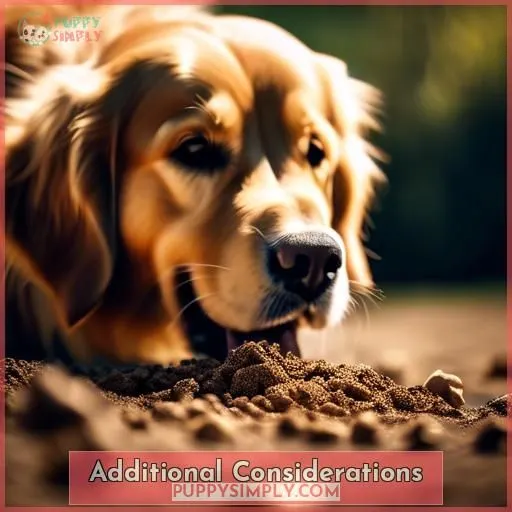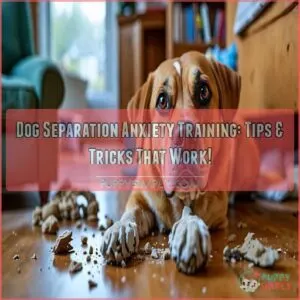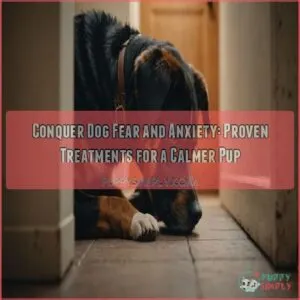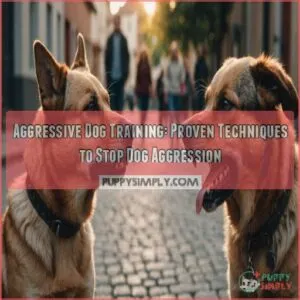This site is supported by our readers. We may earn a commission, at no cost to you, if you purchase through links.
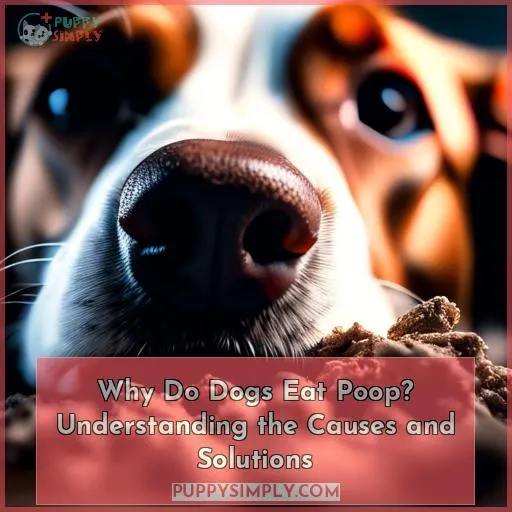
Dogs may eat poop for various reasons, such as maternal instincts, nutritional deficiencies, or boredom. However, if your dog is eating poop, it could be a sign of underlying medical conditions or anxiety.
If your dog is eating cat poop, it might be due to the high protein and fat content. Puppies may start eating poop as a normal part of their development, but it’s not a sign of health problems.
To prevent coprophagia, you can limit access to poop, use coprophagic supplements, and provide proper nutrition and exercise. If you’re concerned about your dog’s behavior, consult with a veterinarian for a proper diagnosis and treatment plan.
Table Of Contents
- Key Takeaways
- Why Do Dogs Eat Poop?
- Normal Reasons Why Dogs Eat Poop
- Is It Behavioral or Medical?
- Who’s the Offender?
- Whose Waste is It, Anyway?
- Prevent Access
- Train Early and Often
- Ensure His Exercise and Enrichment Needs Are Met
- Provide Proper Nutrition and Veterinary Care
- Make Poop Unappealing
- Additional Considerations
- Frequently Asked Questions (FAQs)
- Conclusion
Key Takeaways
- Dogs may eat poop for various reasons, including maternal instincts, nutritional deficiencies, or boredom.
- If your dog is eating cat poop, it might be due to the high protein and fat content.
- Coprophagia, the scientific term for eating poop, is a complex behavior with multifaceted origins.
- To prevent coprophagia, consider the following strategies: 1. Preventing access to poop 2. Using coprophagic supplements 3. Controlling access for puppies 4. Reducing anxiety for confined dogs 5. Redirecting attention with treats and toys
Why Do Dogs Eat Poop?
Dogs may eat poop for various reasons, including normal behaviors like nursing female dogs eating their young’s poop to keep their den clean or instinctual behavior, as well as abnormal reasons such as attention-seeking, anxiety, or boredom. Some dogs may eat the poop of other species due to the nutrients it contains, but this can also introduce harmful bacteria. If your dog is exhibiting this behavior, it’s essential to consult with a veterinarian to rule out underlying medical conditions, such as intestinal parasites, nutritional deficiencies, or gastrointestinal diseases.
Normal Reasons Why Dogs Eat Poop
Why do dogs eat poop? Understanding the causes is crucial for finding solutions. Normal reasons include nursing mothers cleaning den, instinctual wolf behavior, and puppies exploring with their mouths.
Abnormal Reasons Why Dogs Eat Poop
Dogs may eat poop for various reasons, some of which are considered normal, while others are abnormal. Normal reasons include:
- Nursing mothers cleaning the den
- Instinctual wolf behavior
- Poop of other animals containing nutrients
- Puppies exploring with their mouths
- Dogs finding poop tasty
Abnormal reasons include:
- Attention-seeking behavior
- Underlying medical conditions
- Anxiety or displacement behavior
- Fear of punishment
- Learned behavior from previous punishment
To stop coprophagia, consider the following strategies:
- Preventing access to poop
- Using coprophagic supplements
- Controlling access for puppies
- Reducing anxiety for confined dogs
- Redirecting attention with treats and toys
Remember that coprophagia is the scientific term for eating poop. Eating poop of other species is considered normal, while eating own poop or other dogs’ poop is considered abnormal.
Dogs That Eat Cat Poop
Dogs that eat cat poop may be doing so for a variety of reasons. Here are three common reasons:
- Taste: Cat poop may taste appealing to dogs due to the high protein and fat content in cat food. This can make cat poop taste similar to cat food, which dogs may find irresistible.
- Deficiencies: Dogs may eat cat poop to compensate for nutritional deficiencies in their own diet. The high protein content in cat poop can be attractive to dogs with dietary deficiencies.
- Boredom: Dogs may engage in coprophagia (eating poop) as a way to alleviate boredom.
It’s important to note that while eating cat poop is a normal behavior for dogs, it can have health risks, including the potential for contracting parasites or diseases from the cat’s feces. If your dog is exhibiting this behavior, it’s recommended to consult with a veterinarian to rule out any underlying medical conditions.
Puppies That Start Eating Poop
When your puppy starts snacking on their own poop, it’s often just a case of mimicry, not a cry for help. They’re copying their mother, not sending SOS signals about nutritional deficiencies or digestion woes.
It’s a dog behavior quirk, not a deliberate attention-seeking ploy. So, while puppy eating poop might wrinkle your nose, it’s a normal part of puppy behavior development.
Dogs That Are Crated or Have Anxiety or Separation Anxiety
Dogs that are crated or have anxiety or separation anxiety may eat poop for several reasons. Here are four ways to address this behavior:
- Prevent Access: Keep the crate clean and remove any poop immediately. If the dog is left alone for extended periods, make sure the yard is clean and that the dog can’t get to other animals’ poop.
- Training: Teach the dog to associate the crate with positive experiences, such as treats or toys. For dogs with anxiety or separation anxiety, consider crate training and using positive reinforcement techniques to encourage calm behavior.
- Environmental Enrichment: Provide the dog with plenty of toys and activities to keep them engaged and reduce boredom. For dogs with anxiety or separation anxiety, consider using pheromone diffusers or calming aids to create a more soothing environment.
- Consult a Professional: If the dog’s poop-eating behavior continues, talk to a veterinarian or a dog behaviorist. They can help find any underlying medical or behavioral issues that may be contributing to the problem.
Adult Dogs That Have Learned to Eat Their Poop
When adult dogs chow down on their own poop, it’s not just a quirky snack choice. It could be boredom turning their attention to this unsavory habit, or perhaps they’re seeking your gaze, even if it’s in horror. Stress, isolation, or a fear of punishment can also lead them down this path.
Training and making poop less appealing are key to turning their taste buds around.
Is It Behavioral or Medical?
If your furry companion is indulging in poop consumption, it’s crucial to ascertain if it’s a quirk of their nature or a symptom of an underlying health concern. Here are five key factors to ponder:
- Behavioral Triggers: Dogs might partake in poop-eating as a natural instinct, such as nursing mothers tidying up their abode or inquisitive pups discovering the world with their tongues. Some canines may also resort to this behavior to ease boredom or unease.
- Medical Roots: Poop-eating can be a telltale sign of medical ailments, such as nutritional imbalances, digestive disorders, or intestinal parasites.
- Attention Cravings: Dogs may engage in poop-eating to garner attention or conceal the remnants of an unfortunate accident.
- Displacement Mechanism: Anxious dogs might turn to poop-eating as a way to cope with confinement or the fear of punishment for an accident.
- Learned Behavior: Dogs may adopt poop-eating behavior through interactions with other dogs or as a consequence of punishment for accidents.
To unravel the enigma of your dog’s poop-eating habits, seek guidance from a veterinarian. They can conduct a thorough examination and recommend appropriate tests to eliminate any underlying medical conditions. If the root of the behavior lies in the realm of psychology, your veterinarian can offer expert advice on training techniques and environmental adjustments to curb this undesirable habit.
Who’s the Offender?
Concerning the practice of coprophagia, the culprit can fluctuate based on the circumstances. Here are essential elements to ponder:
- Breed and Age: Coprophagia is more prevalent in specific breeds, such as Labrador Retrievers and Bulldogs. It can also emerge in puppies, particularly those under 1 year old, due to curiosity or nutritional deficiency.
- Gender Variations: Female canines are more susceptible to consuming feces compared to male canines.
- Fecal Preferences: Canines may exhibit preferences for the feces they ingest, such as a proclivity for fresh feces that are one to two days old.
- Personality Characteristics: Canines that are confined to crates or exhibit anxiety or separation anxiety may be more prone to engaging in coprophagia. Adult canines that have acquired the habit of consuming their feces may also be more likely to perpetuate this behavior.
- Medical Conditions: Coprophagia can serve as an indicator of underlying medical conditions, such as nutritional deficiencies, digestive disorders, or intestinal parasites.
- Training and Environment: Canines that lack proper training or access to a hygienic environment may be more likely to engage in coprophagia.
To eradicate coprophagia, it’s paramount to address the underlying causes. This may entail employing training techniques, implementing lifestyle modifications, administering medication, or utilizing a combination of these approaches. Bear in mind, coprophagia is a complex behavior with multifaceted origins, necessitating a comprehensive approach.
Whose Waste is It, Anyway?
You may be wondering, Why do dogs eat excrement? Well, it turns out that the excrement your dog is consuming isn’t just from their own species. Dogs have been known to eat cat excrement, and even pups may start eating excrement as they grow. But why would they do this?
One theory suggests that dogs eat cat excrement because it contains nutrients that are beneficial to them. However, eating cat excrement can also pose health risks, as it may contain harmful bacteria and parasites.
Pups that start eating excrement often do so to imitate their mother’s behavior. Nursing female dogs often eat the excrement of their young to keep their shelter clean. This behavior is normal and common in pups, but it usually fades before the pup is about nine months old.
Dogs that are confined or have nervousness or separation nervousness may eat excrement as a way to alleviate tedium or to evade nervousness. Dogs that are food-driven and steal sustenance are also more likely to eat excrement.
Adult dogs that have learned to eat their excrement may do so for attention-seeking reasons. If you react strongly when you catch your dog eating excrement, they may continue the behavior as a way to get noticed.
To prevent your dog from eating excrement, you can take several steps. First, make certain that your dog’s exercise and enrichment needs are met to prevent tedium and nervousness. Provide positive reinforcement and redirect your dog’s attention with treats and toys. You can also use deterrents like coprophagia supplements to make excrement less appealing to your dog.
Prevent Access
Preventing your dog from consuming feces begins with comprehending their litter box habits and dog park etiquette. If your dog persistently sniffs and ingests feces, they could be attempting to replicate their mother’s behavior or simply find it palatable. To resolve this, ensure that you swiftly and appropriately clean up after your dog and dispose of their waste responsibly. This not only prevents your dog from consuming their own feces but also diminishes the risk of them ingesting parasites or diseases from the feces of other animals.
Additionally, contemplate the underlying reasons for your dog’s affinity for feces. Is it a learned behavior resulting from prior punishment or an attention-seeking tactic? Comprehending the root cause empowers you to implement more effective preventative strategies. For instance, if your dog is confined to a crate or experiences anxiety or separation anxiety, providing them with more enrichment and exercise can assist in alleviating their stress and interest in feces.
Lastly, consider employing deterrents such as coprophagia supplements to render feces less appealing to your dog. By adopting these preventative measures, you can assist your dog in breaking the habit of consuming feces and safeguarding their health and well-being.
Train Early and Often
Training your dog early and frequently is essential for preventing and correcting coprophagia, or the eating of poop. Positive reinforcement techniques, such as using treats and praise, can aid your dog in associating good behavior with positive outcomes. This can involve teaching your dog to leave it and come commands, which can be used to divert their attention away from poop. Additionally, providing high-value treats and rewards specifically for not eating poop can help reinforce the desired behavior. Training cues like leave it and come can also be used to redirect your dog’s attention when they’re near poop.
Early intervention is paramount, as puppies may start eating poop as a way to emulate their mother’s behavior or due to boredom or anxiety. By addressing this behavior early on, you can help your dog develop good habits and prevent it from becoming a persistent problem. Remember to be patient and consistent with your training efforts, as it may take time for your dog to fully grasp and follow the new commands.
Ensure His Exercise and Enrichment Needs Are Met
Guarantee Your Dog’s Exercise and Enrichment Needs Are Fulfilled
Dogs crave mental and physical stimulation to uphold their overall well-being and minimize stress and anxiety. Enrichment activities can provide an outlet for their innate instincts, enhance cognitive abilities, and strengthen the bond between you and your companion. Here are four ways to guarantee your dog’s exercise and enrichment needs are fulfilled:
- Interactive Toys and Puzzles: Puzzle toys, treat-dispensing toys, and bully stick holders can provide mental stimulation while keeping energetic dogs engaged and entertained for extended periods. These toys can be utilized to conceal treats, making them more captivating for your dog.
- Game-Based Playtime: Simple games like ‘Be Neat’ or ‘Toy Box’ can be enjoyable, interactive methods for your dog to relish additional physical exercise while exercising their minds.
- Training: Basic obedience training and advanced training such as agility and scent work can assist with restlessness and obedience issues, while simultaneously enhancing your dog’s self-assurance and sense of security.
- Smelling Walks: Taking your dog on walks that permit them to explore with their noses can provide both physical and mental stimulation.
Provide Proper Nutrition and Veterinary Care
Proper nutrition is vital for your dog’s overall health and plays a significant role in preventing coprophagia. A balanced diet that provides all the necessary vitamins, minerals, proteins, and complex carbohydrates can help support a robust immune system, a shinier coat, more energy, and other essential health benefits.
However, if your dog is experiencing digestive issues, it could be due to nutritional deficiencies or digestion problems. Symptoms such as vomiting, diarrhea, weight loss, or constipation can indicate digestive problems that may require veterinary attention. It’s imperative to consult with your veterinarian to diagnose and treat any underlying health concerns, as failing to seek medical assistance can worsen symptoms and prolong your dog’s suffering.
In addition to addressing any medical issues, you can take steps to provide proper nutrition and prevent coprophagia. Ensuring your dog’s diet is balanced and nutritious, and avoiding feeding them table scraps or other unhealthy foods, can help prevent digestive problems and reduce the likelihood of coprophagia.
Make Poop Unappealing
Dogs eating poop, also known as coprophagia, can be a concerning behavior for pet owners. While it’s not entirely clear why dogs engage in this behavior, there are several reasons that have been identified. In this section, we’ll discuss how to make poop unappealing to your dog, using coprophagia supplements and taste aversion products**.
Firstly, it’s important to understand that dogs have a natural instinct to eat poop, especially when they’re puppies. This behavior is often a result of their mother cleaning them and their nest, which can lead to an association between poop and cleanliness. However, as dogs grow older, this behavior may become more problematic and could indicate underlying medical issues or nutritional deficiencies.
To make poop unappealing, you can use coprophagia supplements that alter the taste or scent of the stool, making it less palatable to your dog. These supplements can be added to your dog’s food and are often effective in deterring coprophagia. Additionally, taste-aversion products can be used, which work by associating a particular taste with nausea, making the poop less appealing to your dog.
It’s worth noting that not all supplements and products are effective for all dogs, and some may require a period of trial and error to determine their effectiveness. It’s also essential to consult with your veterinarian before introducing any new supplements or products to your dog’s diet, as they can provide guidance on the most appropriate solution for your pet’s specific needs.
Additional Considerations
You’ve learned why dogs might turn to eating poop, from behavioral triggers to underlying medical conditions. Now, let’s explore how these factors play out in prevention strategies, ensuring your dog’s health and happiness.
Behavioral Causes Analysis
Coprophagia triggers can be behavioral, such as attention-seeking motivations, boredom and anxiety impacts, and stress-induced consumption. Punishment-driven consequences may also contribute to this behavior. To analyze these causes, consider the following:
- Attention-seeking motivations: Dogs may eat poop to get attention from their owners.
- Boredom and anxiety impacts: Dogs may engage in coprophagia to alleviate boredom or anxiety.
- Stress-induced consumption: Dogs may eat poop as a coping mechanism for stress.
Medical Conditions Impact
Dogs eating poop, a behavior known as coprophagia, can be a sign of underlying medical conditions. Digestive issues such as intestinal parasites can cause nutritional deficiencies and lead to this behavior. Specific illnesses like diabetes, Cushing’s, and thyroid disease can increase appetite, resulting in dogs consuming poop.
Nutritional deficiencies and malabsorption syndromes can also contribute to this behavior. Consulting a veterinarian is crucial to diagnose and treat these underlying conditions.
Prevention Strategies Overview
To prevent coprophagia (the consumption of feces) in dogs, it’s essential to implement proper disposal practices. This includes regularly cleaning up and disposing of any feces in the yard. Providing environmental enrichment, such as toys and activities, can also help alleviate stress and boredom, which can contribute to this behavior.
Examining your dog’s diet and considering probiotic supplements may be beneficial, as dietary imbalances can sometimes lead to coprophagia. Maintaining a clean yard and closely supervising walks can also help discourage the behavior.
Utilizing training commands like leave it and come can be effective in teaching your dog to avoid and refrain from consuming feces. For puppies, offering guidance and positive reinforcement during the training process is crucial.
In some cases, making the feces unappetizing through the use of deterrents may be necessary. However, it’s important to seek professional advice from a veterinarian if your dog exhibits unusual or persistent coprophagia, as there may be an underlying medical or behavioral issue that requires specialized treatment.
Frequently Asked Questions (FAQs)
Is it dangerous for dogs to eat their own poop?
Eating poop, known as coprophagia, can be a normal behavior for dogs, especially for puppies and mother dogs. However, it can also be a sign of underlying medical issues or other behavioral problems. If your dog is eating their own poop, it’s generally not dangerous, but it may indicate a nutritional deficiency or intestinal parasites.
If your dog is eating the poop of other animals, there’s a risk of parasites and diseases. To prevent coprophagia, you can limit access to poop, provide positive reinforcement training, and consider supplements or enzymes to make poop less appealing.
If your dog’s behavior persists or is causing concern, consult with a veterinarian to rule out any underlying medical issues.
What are the most common reasons why dogs eat poop?
Dogs eat poop for various reasons, including anxiety, attention-seeking, isolation, confinement, or inappropriate association with food. Some dogs may eat poop due to nutritional deficiencies, underlying medical issues, or intestinal parasites. Greedy eaters are more likely to engage in this behavior, and it may be a sign of anxiety or a way to get attention.
Prevention methods include vitamin or enzyme supplements, training, and environmental management.
How can I prevent my dog from eating poop?
To stop your dog’s poop-eating habit, keep your yard clean, supervise walks, and use leave it commands. Consider dietary adjustments and consult your vet for underlying issues. Remember, patience and consistency are key!
Can coprophagia be a sign of an underlying medical condition?
Coprophagia, or the act of consuming feces, can indicate an underlying medical concern in dogs. Some of the prevalent medical causes include:
Intestinal parasites
Diabetes
Inflammatory bowel disease
Anemia
Vitamin deficiency
Malnutrition
Thyroid disease
Neurological disease
If your dog is displaying coprophagia, it’s crucial to consult with a veterinarian to ascertain if there’s an underlying medical issue that necessitates attention.
What should I do if my dog suddenly starts eating poop?
If your dog suddenly starts eating poop, it could be due to various reasons, such as nutritional deficiencies, underlying medical issues, or behavioral problems. To address this issue, you should first rule out any medical conditions by consulting with your veterinarian. They may recommend dietary changes, supplements, or other treatments to address any underlying health issues.
Additionally, you can try training methods, such as teaching your dog the leave it command and using positive reinforcement. You can also manage your dog’s environment by keeping the yard clean, supervising during walks, and using deterrents like bitter-tasting sprays or additives for their food.
Conclusion
Dogs may eat poop due to various reasons, including nutritional deficiencies, boredom, or anxiety. In some cases, it could be a sign of underlying medical conditions.
To prevent coprophagia, consider limiting access to poop, providing proper nutrition and exercise, and consulting with a veterinarian if you’re concerned about your dog’s behavior.
If you’ve ever found yourself wondering why dogs eat poop, you’re not alone. This behavior can be concerning for pet owners, but understanding the causes can help you address the issue effectively.

